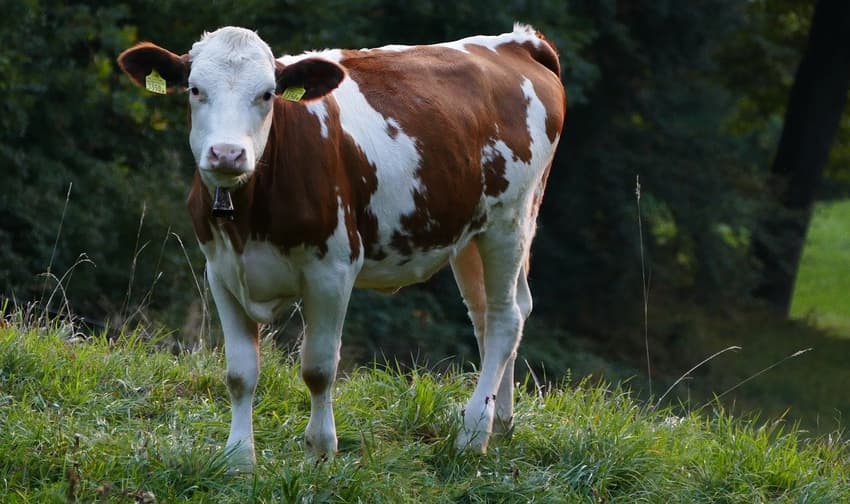‘Critical situation’: Drought threatens Switzerland’s cheese production

The long dry spell has impacted much of the country’s agriculture, including the production of milk and cheese in some Swiss regions.
It is difficult to imagine Switzerland without its cheese, but the heatwave and lack of water is playing a part in this worst-case scenario, with even the iconic Gruyère under threat.
Usually, Swiss cows spend the summer high up the mountains, grazing on Alpine pastures until they are brought down - sometimes with a bit of local ceremony - from the mountains onto the plain in the fall.
But this year’s heatwave and drought have disrupted this traditional process - with parched meadows running short of both grass and water, forcing farmers in canton of Vaud to bring their cattle to the lower ground in the middle of summer.
Vaud agricultural authorities estimate that 60 out of Jura’s 200 mountain pastures are “in acute lack of water” and even though the canton is supplying water to the breeders, "the unprecedented heatwave will in any case affect the production of milk and cheese", Le Temps daily reported.
READ MORE: EXPLAINED: Why are cows so important in Switzerland?
The situation is similarly dire in the canton of Fribourg, where the famous Gruyère cheese has been produced for centuries.
"The situation is tense, even critical”, according to Frédéric Ménétrey, director of the Fribourg Chamber of Agriculture, who said that 15 alpine pastures that are inaccessible by road are being supplied by private helicopters.
With “lack of water and dry grass”, milk production could be reduced by “20 to 30 percent”, Said Dominique de Buman, president of the Fribourg Cooperative of Alpine Cheese Producers.
This also means that less Gruyère will be made this year and, if heatwaves and droughts become a standard summer weather, “we must reflect on how to adapt the alpine economy and agriculture to global warming”, Éric Mosimann, manager of the Vaud Society of Alpine Economy, pointed out.
READ MORE: How Switzerland is protecting its cheeses from foreign influence
Comments
See Also
It is difficult to imagine Switzerland without its cheese, but the heatwave and lack of water is playing a part in this worst-case scenario, with even the iconic Gruyère under threat.
Usually, Swiss cows spend the summer high up the mountains, grazing on Alpine pastures until they are brought down - sometimes with a bit of local ceremony - from the mountains onto the plain in the fall.
But this year’s heatwave and drought have disrupted this traditional process - with parched meadows running short of both grass and water, forcing farmers in canton of Vaud to bring their cattle to the lower ground in the middle of summer.
Vaud agricultural authorities estimate that 60 out of Jura’s 200 mountain pastures are “in acute lack of water” and even though the canton is supplying water to the breeders, "the unprecedented heatwave will in any case affect the production of milk and cheese", Le Temps daily reported.
READ MORE: EXPLAINED: Why are cows so important in Switzerland?
The situation is similarly dire in the canton of Fribourg, where the famous Gruyère cheese has been produced for centuries.
"The situation is tense, even critical”, according to Frédéric Ménétrey, director of the Fribourg Chamber of Agriculture, who said that 15 alpine pastures that are inaccessible by road are being supplied by private helicopters.
With “lack of water and dry grass”, milk production could be reduced by “20 to 30 percent”, Said Dominique de Buman, president of the Fribourg Cooperative of Alpine Cheese Producers.
This also means that less Gruyère will be made this year and, if heatwaves and droughts become a standard summer weather, “we must reflect on how to adapt the alpine economy and agriculture to global warming”, Éric Mosimann, manager of the Vaud Society of Alpine Economy, pointed out.
READ MORE: How Switzerland is protecting its cheeses from foreign influence
Join the conversation in our comments section below. Share your own views and experience and if you have a question or suggestion for our journalists then email us at [email protected].
Please keep comments civil, constructive and on topic – and make sure to read our terms of use before getting involved.
Please log in here to leave a comment.